
"Funkytown" is a song by American disco-funk group Lipps Inc., written and produced by Steven Greenberg and released by Casablanca Records in March 1980 as the second single from the group's 1979 debut studio album Mouth to Mouth.

"Roxanne" is a song by British rock band the Police. The song was written by lead singer and bassist Sting and was released as a single on 7 April 1978, in advance of their debut album Outlandos d'Amour, released on 3 November. It was written from the point of view of a man who falls in love with a prostitute. When re-released on 12 April 1979, the song peaked at No. 12 on the UK Singles Chart.
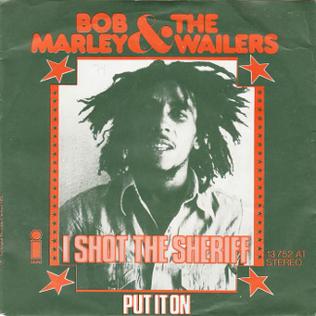
"I Shot the Sheriff" is a song written by Jamaican reggae musician Bob Marley and released in 1973 with his band the Wailers.

"No Limit" is a song recorded by Belgian/Dutch Eurodance group 2 Unlimited, released in January 1993 by Byte, ZYX and PWL. It was their fifth single in total and the first to be released from their second album, No Limits! (1993). Co-written by the group's Ray Slijngaard and Anita Dels, the song became one of their most commercially successful singles, especially in Europe, reaching the number-one spot in 35 countries and the top 10 in several others. Like previous releases, the UK version of the single removed all of the raps from Slijngaard, leaving just Dels' vocals. One word from the rap was kept, the word 'Techno' which was looped and repeated during the middle of the song, turning the line into "Techno! Techno! Techno! Techno!" and giving the song an extra vocal hook. Its accompanying music video was directed by Nick Burgess-Jones and received heavy rotation on MTV Europe.
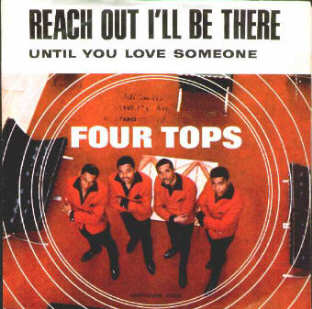
"Reach Out I'll Be There" (also formatted as "Reach Out (I'll Be There)") is a song recorded by American vocal quartet Four Tops from their fourth studio album, Reach Out (1967). Written and produced by Motown's main production team, Holland–Dozier–Holland, the song is one of the most widely-known Motown hits of the 1960s and is today considered the Four Tops' signature song.
"Always on My Mind" is a ballad written by Wayne Carson, Johnny Christopher, and Mark James, first recorded by Brenda Lee and first released by Gwen McCrae in March 1972. Lee's version was released three months later in June 1972. The song has been a crossover hit, charting in both the country and western and pop categories. Elvis Presley's recording was the first commercially successful version of the song.

"Venus" is a song by Dutch rock band Shocking Blue, released as a single in the Netherlands in the summer of 1969. Written by Robbie van Leeuwen, the song topped the charts in nine countries.

"Stayin' Alive" is a song written and performed by the Bee Gees from the Saturday Night Fever motion picture soundtrack. The song was released in December 1977 by RSO Records as the second single from the Saturday Night Fever soundtrack. The band co-produced the song with Albhy Galuten and Karl Richardson. It is one of the Bee Gees' signature songs. In 2004, "Stayin' Alive" was placed at No. 189 by Rolling Stone on their list of the 500 Greatest Songs of All Time. The 2021 updated Rolling Stone list of 500 Greatest Songs placed "Stayin' Alive" at No. 99. In 2004, it ranked No. 9 on AFI's 100 Years...100 Songs survey of top tunes in American cinema. In a UK television poll on ITV in December 2011 it was voted fifth in The Nation's Favourite Bee Gees Song.
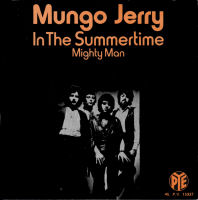
"In the Summertime" is the debut single by British rock band Mungo Jerry, released in 1970. It reached number one in charts around the world, including seven weeks on the UK Singles Chart, two weeks on one of the Canadian charts, and number three on the Billboard Hot 100 singles chart in the US. It became one of the best-selling singles of all-time, eventually selling 30 million copies. Written and composed by the band's lead singer, Ray Dorset, while working in a lab for Timex, the lyrics of the song celebrate the carefree days of summer. The track was included on the second album by the band, Electronically Tested, issued in March 1971.
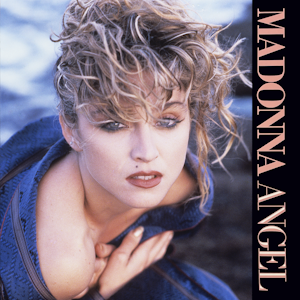
"Angel" is a song by American singer Madonna from her second studio album Like a Virgin (1984). It was released on April 10, 1985, by Sire Records as the album's third single. Written by Madonna and Steve Bray, it was one of the first songs developed for the project and, according to Madonna, was inspired by a girl who is saved by an angel, and she falls in love with him. "Angel" was released as a 12-inch single with "Into the Groove" in some countries and charted likewise. A music video was not filmed for "Angel", and instead, a promotional clip comprising segments of her previous videos was released in the United Kingdom.

"Heart of Glass" is a song by the American new wave band Blondie, written by singer Debbie Harry and guitarist Chris Stein. It was featured on the band's third studio album, Parallel Lines (1978), and was released as the album's third single in January 1979 and reached number one on the charts in several countries, including the United States and the United Kingdom.

"Upside Down" is a song written and produced by Chic members Nile Rodgers and Bernard Edwards. It was recorded by American singer Diana Ross and issued on June 18, 1980 from Motown as the lead single from her eleventh studio album, Diana (1980). The song hit number one on the Billboard Hot 100 chart on September 6, 1980 and stayed there for four weeks. It also hit number one on the Billboard Disco and Soul charts. The single was released a full four weeks after the album was released.

"Run to You" is a song performed by American singer and actress Whitney Houston, released on June 21, 1993, by Arista Records as the fourth single from The Bodyguard: Original Soundtrack Album (1992). It was written by Jud Friedman and Allan Rich, and produced by David Foster. Originally intended to be a break-up song, it was approved by the production and stars. However, a month later, the director of The Bodyguard called, saying he liked the song so much, but he'd rather have it to be a love song so the entire song was rewritten, except for the title.

"Those Were the Days" is a song composed by Boris Fomin (1900–1948) but credited to Gene Raskin, who put a new English lyric to Fomin's Russian romance song "Dorogoi dlinnoyu", with words by the poet Konstantin Podrevsky. It deals with reminiscence upon youth and romantic idealism. It also deals with tavern activities, which include drinking, singing and dancing.

"Ring My Bell" is a 1979 disco song written by Frederick Knight. The song was originally written for eleven-year-old Stacy Lattisaw as a teenybopper song about children talking on the telephone. When Lattisaw signed with a different label, American singer and musician Anita Ward was asked to sing it instead, and it became her only major hit.
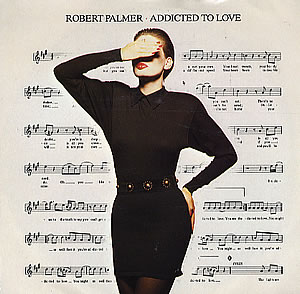
"Addicted to Love" is a song by English rock singer Robert Palmer released in 1986. It is the third song on Palmer's eighth studio album Riptide (1985) and was released as its second single. The single version is a shorter edit of the full-length album version.

"Again" is a song by American rock musician Lenny Kravitz, being the only new song from his first Greatest Hits album, released in 2000. Written, arranged and produced by himself, "Again" was initially set to be on his sixth studio album; however, Kravitz found that the song didn't fit the tone of the album, releasing it instead as the lead single from the compilation on September 22, 2000, through Virgin Records. The mid-tempo rock ballad finds Kravitz wondering if he will ever see his former lover again and if they will reunite once more.
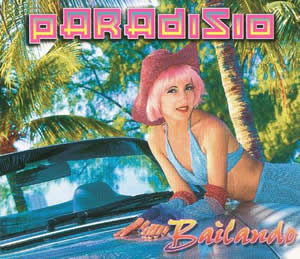
"Bailando" is a song by Belgian group Paradisio. It was released in 1996 as the lead single from their debut album, Paradisio. The song is produced by Patrick Samoy and Luc Rigaux and reached number-one in Italy, Denmark, Norway, Finland and Sweden. It peaked at number 2 in Belgium. In Sweden, it was the best selling single by being triple platinum. The song was a hit in most countries across Europe during the summer of 1997.
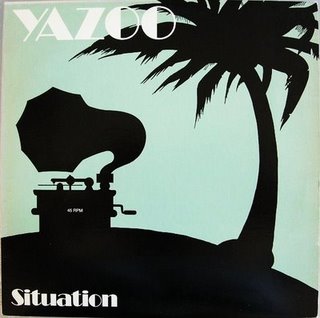
"Situation" is a 1982 single by British synth-pop band Yazoo. The song was released in the UK as the B-side to Yazoo's debut single "Only You", which went to number two on the UK Singles Chart. Released as a single in North America, the song peaked at number 73 on the Billboard Hot 100 chart in the US, and hit the top 40 in Canadian charts, peaking at number 31. In late-summer 1982 it became Yazoo's first song to top the Billboard Hot Dance Club Play chart, remaining at number one on this chart for four weeks. It also crossed over to the Black Singles chart, peaking at number 31.

"And the Beat Goes On" is a 1979 single by the American music group The Whispers. The song was their first of two number-one singles on the Soul chart, and their first Top 20 hit on the Billboard Hot 100, peaking at number 19. "And the Beat Goes On" was the group's only number-one song on the dance chart. It was also their first and biggest hit in the United Kingdom, peaking at number 2 on the UK Singles Chart. The song also peaked at number 27 on the Canadian RPM chart.



















